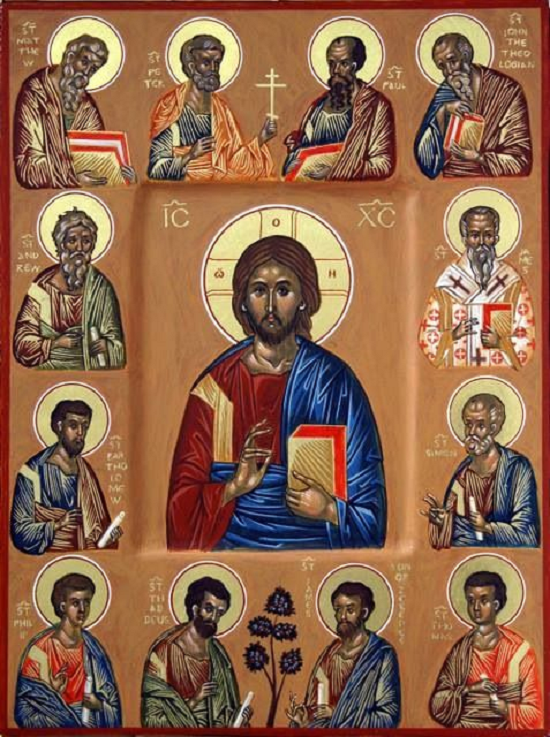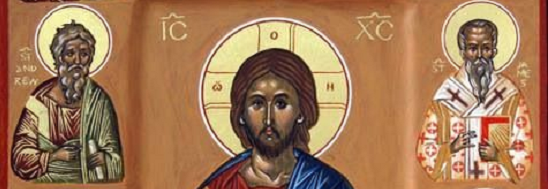The Unity Prayer
Sixth Sunday of Easter (First Reading)
Sixth Sunday of Easter (Second and Gospel Readings)

This morning, we have in our gospel reading the second half of a prayer offered by Jesus himself as quoted by John. Many times throughout the gospels we’re told that Jesus prayed, but in only a very few instances are we given Jesus’s words: the Lord’s Prayer, the Agony in the Garden, and here. Of these, the Lord’s Prayer is arguably the closest text we have to Jesus’s exact words. Since it’s highly unlikely that there was a scribe at the Last Supper taking down Jesus’s prayer, what we have here in this passage is most certainly John’s theological reflections on the significance of this event, seeing that it was the last time Jesus and the twelve would be together prior to his offering himself on the cross the following day.
At the beginning of chapter seventeen, John shifts his narration from Jesus’s discourse to his Apostles to this prayer itself. Scholars have seen in these words a prayer of consecration or even a eucharistic prayer. We know that there’s no mention of the eucharist at the Last Supper in John’s Gospel. Yet, here in this prayer, we find eucharistic concepts and elements that have led commentators to describe it as “Jesus’s priestly prayer.” It’s in two parts: in verses one through nineteen, Jesus extends the consecration to his apostles and himself to the Father; in verses twenty to twenty-six, Jesus is consecrating all believers—that is, the Church—and that includes you and me. That second portion of the prayer is what we find in the gospel today.
Using a traditional prayer posture, looking up to heaven, Jesus prays to his Father for us—for the Church—who have received the Good News from the Apostles. What does he pray for? “That they may all be one.” As we survey the world and see the condition of Christianity today, we have to ask, “What happened?” Was Jesus’s priestly prayer in vain? If we were to list the attributes of contemporary Christianity, I’m not sure that “unity” would even make the list. If we were to gather together all those groups that self-identify as Christian, I’m afraid the only thing they’d have in common—when you came right down to it—would be the name. They may spend some energy fighting against other faiths or secularism, but I think they spend the majority of it fighting each other. That doesn’t sound like the kind of situation that Jesus envisioned for his Church.
As we look at the words of this prayer for the Church, we notice right away that the unity that Christ prays for is not so much a unity of speech or even action, but a unity of being. “That they may all be one as you, Father, are in me and I in you, that they also may be in us…” And again, “That they may be one, as we are one, I in them and you in me…” This is then, par excellence, Jesus’s eucharistic prayer. It effects the Real Presence—the Real Presence of the Father in the Son and the Real Presence of the Son in the Church.
When we consider the Real Presence in eucharistic terms, we speak of a consecration; and this prayer of Jesus’s is most certainly that. In the three verses immediately before this gospel passage, Jesus offers an explicit prayer of consecration for his Apostles. He prays, “[Father,] consecrate them in the truth. Your word is truth. As you sent me into the world, so I send them into the world. And I consecrate myself for them, so that they also may be consecrated in truth.” What “truth” is it that Jesus refers to here? It’s nothing less than reality—the reality of the Incarnation—that God has become one with his creation and with his people who recognize and trust in him. Again, the Church is consecrated to be the Real Presence of the Body and Blood of Christ alive in the world in us. Whatever is consecrated is set apart and dedicated to the service of God. Things are consecrated for specific purposes. People are consecrated for specific missions. But the Church is consecrated to be nothing less than the presence of God in Christ in the world.
Has the Church failed to live out its consecration faithfully? Not entirely. Throughout its history, there have been slices of time and pockets of individuals where the Church, through its service, has shown that the Incarnation continues and that God has not abandoned his creation or his faithful people. However, hasn’t it, at the same time, profaned its consecration? Hasn’t it conflated unity with uniformity? Hasn’t it continually preferred uniformity of thought, word, and action, over the unity that comes from unconditional love and acceptance? Like the Jewish people, our forebears in faith, haven’t we preferred the security and neatness of legalistic conformity to the messiness of diversity? Unlike our Heavenly Father who sends the rain on the just and the unjust, we prefer those who think, speak, and act like we do to those who don’t. And then comes the blasphemous attempt to divide God’s family—the people to whom he came and for whom he gave up his life—into “us” and “them” based on criteria other than the only one that matters: are they children of God, or are they not? Are they seen as members of our spiritual family or are they considered to be something less than we are—something less than human?
The world today mocks Jesus’s eucharistic prayer, consecrating the Church as the Real Presence. It wants to enforce uniformity of thought, word, and action, condemning and punishing those who cannot or will not conform. It wants to give preference and deference to those who are like them by choice or by chance while leaving others to fend for themselves. And they want to exclude and leave by the wayside the needy, the stranger, those less privileged or well-off, and those with whom they disagree. Uniformity, privilege, and exclusivity are not only contrary to the gospel preached by Jesus and the Apostles who were, in Jesus’s own words, “consecrated to the truth,” they also desecrate it, especially when they are preached in the name of Christ.
The true gospel preaches and creates unity—oneness in being—as the Father is in the Son and the Son in us, his Church. It’s a unity born in diversity, in equity, and in inclusivity. That’s the unity that Jesus prayed for and the unity we were consecrated to in Baptism. In every sense, diversity, equity, and inclusion are hallmarks of Christ’s gospel, and those Christians who use DEI as a slur are ridiculing the very gospel they claim to profess.
Get articles from H. Les Brown delivered to your email inbox
